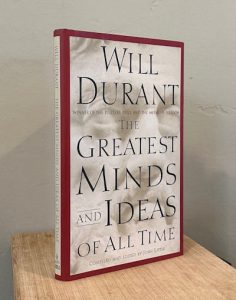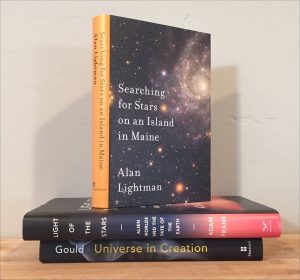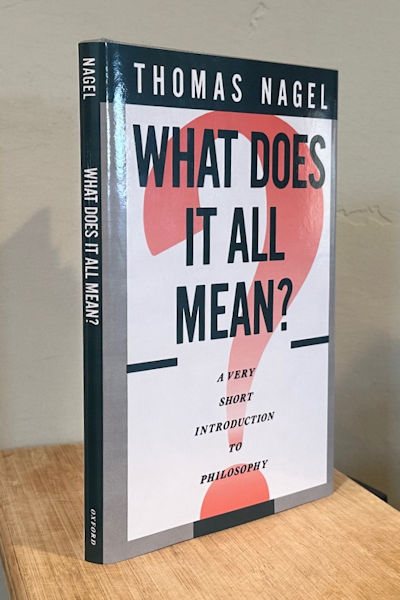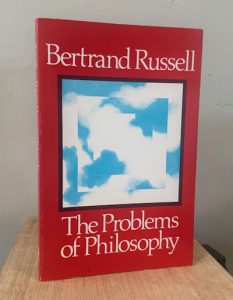 Craig, Edward. 2020. Philosophy: A Very Short Introduction. Oxford. ** 1/2
Craig, Edward. 2020. Philosophy: A Very Short Introduction. Oxford. ** 1/2
A small book in Oxford’s “A Very Short Introduction” series. Unlike the Nagel volume, this one does discuss a number of specific philosophers and their arguments, and in a chronological framework. The author considers philosophy’s three big questions to be: What should we do? What is there? and, How do we know? Topics include the Crito of Plato, Hume’s argument about miracles, a Buddhist text about Nagasena; general topics and various “isms”; and “high spots” Descartes, Hegel, Darwin, and Nitzsche. And then free will, and asking, what is philosophy for? (post)
- Doxiadis, Apostolos, & Papadimitriou, Christos H.. 2009. Logicomix. Bloomsbury. –
Notes forthcoming
 Durant, Will. 2002. The Greatest Minds and Ideas of All Time. Simon & Schuster. ** 1/2
Durant, Will. 2002. The Greatest Minds and Ideas of All Time. Simon & Schuster. ** 1/2
Durant was a well-known historian and public intellectual up until his death in 1981; his major work was the 11-volume THE STORY OF CIVILIZATION, written with his wife. This book is a compilation of various essays, presumably from magazines, amounting to a philosophy fan-boy’s collection of top ten lists. So we get the ten greatest thinkers, ten greatest poets, a hundred best books for an education, and so on. He defends the “great man” theory of history, and his certainty about his choices seems immune from reconsideration (e.g. whether Plato was actually correct or not). At the same time he anticipates Steven Pinker’s later ideas about the progress of morality through the ages. And a quote from Durant’s Wikipedia page reveals his notions about the inevitable decline and rebuilding of civilizations, due to clash between knowledge and mythology/religion. (post)
 Haidt, Jonathan. 2006. The Happiness Hypothesis: Finding Modern Truth in Ancient Wisdom. Basic Books. ****
Haidt, Jonathan. 2006. The Happiness Hypothesis: Finding Modern Truth in Ancient Wisdom. Basic Books. ****
Notes forthcoming.
 Lightman, Alan. 2018. Searching for Stars on an Island in Maine. Pantheon. * 1/2
Lightman, Alan. 2018. Searching for Stars on an Island in Maine. Pantheon. * 1/2
Essays that ponder science, religion, and the yearning for meaning, with some lovely naturalist writing, but mushy on the author’s desire for “meaning” outside the scientific evidence of the real world. It’s an example of the bias in human nature that searches for a story for the world that doesn’t really exist. (post)
 Nagel, Thomas. 1987. What Does It All Mean?: A Very Short Introduction to Philosophy. Oxford. ***
Nagel, Thomas. 1987. What Does It All Mean?: A Very Short Introduction to Philosophy. Oxford. ***
Very short introduction to the classic problems of philosophy, without historical perspective or mention of particular philosophers. Topics include how we know anything; the mind-body problem; free will; right and wrong; the meaning of life. My key thought as I read this was that science has, in fact, in recent decades, resolved some of these matters, and I wonder to what extent philosophy students are taught that. The problems may be classic, but some of the debates are obsolete. Nagel summarizes the debates, and doesn’t mention science. (post)
 Russell, Bertrand. 1959. The Problems Of Philosophy. Oxford Univ Press. *** 1/2
Russell, Bertrand. 1959. The Problems Of Philosophy. Oxford Univ Press. *** 1/2
A short book about the most basic issues of philosophy: how do we know what’s real? How do we know what’s so? Russell drills through “common sense” notions about these issues to their core meanings. Some of the puzzles Russell examines have been illuminated by discoveries in recent decades in evolutionary psychology, animal perceptions, and the diversity of human cultures. His insights on the value of philosophy are profound: it’s a way of breaking out of what is essentially a conservative mindset and instead contemplating the greater reality outside one’s own interests (in much the way, I would say, science fiction can); the post has a couple long quotes. (post)





